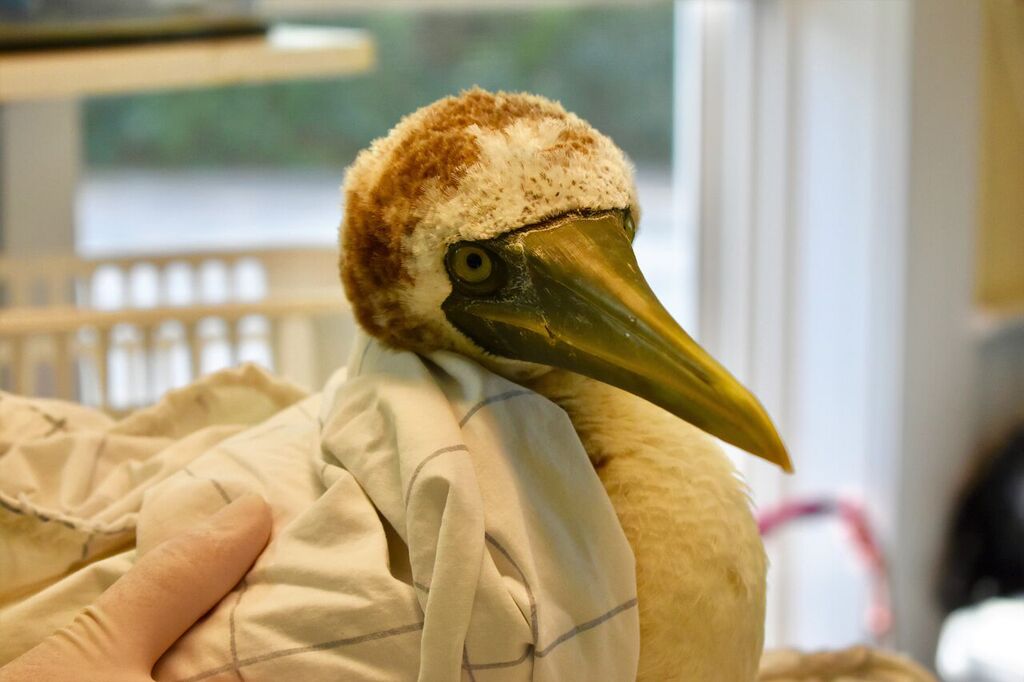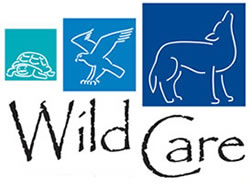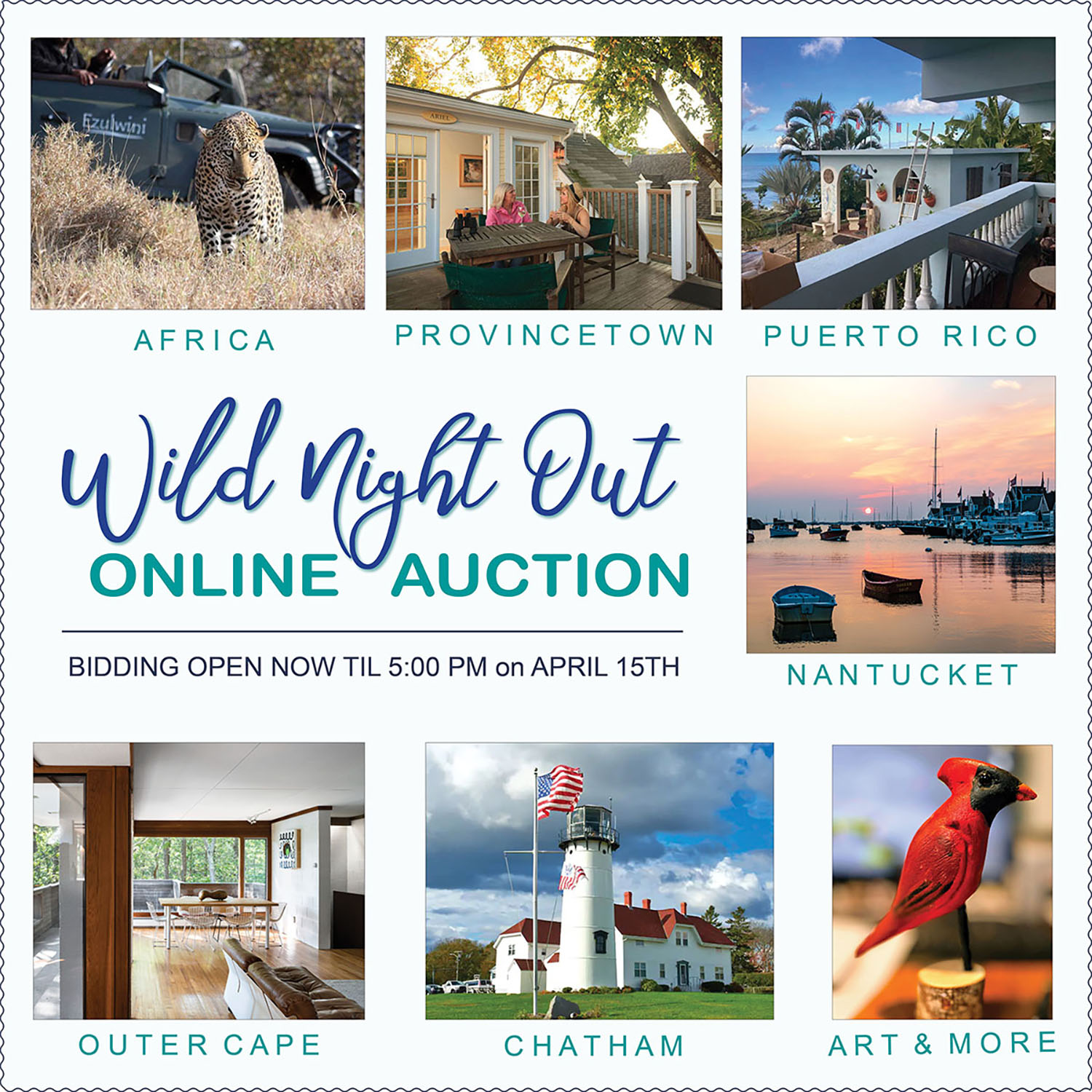
Rare Seabird Bought to Wild Care Succumbs to Illness
Eastham, MA. October 3, 2017. The tropical Masked Booby that has been in care at Wild Care, Inc., a wildlife rehabilitation hospital located in Eastham, passed away in the wee hours of October 2nd after nearly a week of intensive care. The booby was one of dozens of battered seabirds that were left in the wake of Hurricane Jose on Cape Cod. The tropical bird was likely blown over 1,000 miles from it’s oceanic home in the Caribbean, and is the first time this species has been recorded touching down on Massachusetts soils.
Wild Care rescued the bird on September 26th from LeCount’s Hollow Beach in Wellfleet. The bird was in grave condition, emaciated, and showing signs of respiratory distress and advanced illness. “My team of dedicated staff worked tirelessly to treat this bird’s condition and to make sure the bird was comfortable,” stated Stephanie Ellis, Wild Care Executive Director. “We submitted a lab culture to test respiratory secretions, and ran several non-invasive tests in-house. We consulted with seabird experts from International Bird Rescue in California, and also Save Our Seabirds, in Sarasota, Florida, both of which are organizations that work directly with this species. We also consulted with John Kelley, DVM and his staff, at nearby Eastham Veterinary Hospital. The booby was placed on supportive care and was treated with several different medications, but the odds were against him…” states Ellis.
“This bird was carried thousands of miles with the hurricane, and probably had an underlying condition to begin with. He could no longer fly or swim, and chose to beach himself, despite his sea-faring lifestyle. That’s as bad as it gets for a bird,” stated Jennifer Taylor, Wild Care Animal Care Coordinator.
The booby took a turn for the worst on Sunday morning, and was provided with oxygen support for much of the day. “We were all deeply saddened that we could not pull this bird through it’s debilitating illness. I have no doubt that we provided the best possible care, and that the bird was comfortable during its stay. We are grateful for the outpouring of public support. It has helped us tremendously through the intensive care, & through this unfortunate outcome,” states Ellis.
The booby will go to the Tufts Wildlife Clinic at the Cummings School of Veterinary Medicine at Tuft’s University, for a necropsy by Mark Pokras, DVM and Associate Professor Emeritus, to determine the cause of death. The bird will then be transported to the Museum of Comparative Zoology at Harvard University for taxidermy. “I do not know what plans the MCZ has for this bird as of yet, but it warms my heart to think that this booby will at least continue its cycle-of-life as a specimen – to be studied, observed and admired by many, for years to come.” – Ellis.
This Masked Booby is a rare visitor to our shorelines. The Masked Booby breeds throughout the world’s tropical oceans and islands and is most commonly sighted along the Gulf of Mexico, with breeding attempts on the Dry Tortugas, Fl. and the Hawaiian Islands. It is otherwise not commonly seen in North America.
SPECIAL THANKS: Wild Care would like to thank Rebecca Duerr, DVM, Research Director and Veterinarian of International Bird Rescue (IBR) of Cordelia, CA, and Kylie Clatterbuck, Wildlife Center Manager of IBR in Los Angeles, as well as Dana LeWorthy, Avian Hospital Administrator at Save Our Seabirds in Sarasota, FL, for all for their booby expertise, and for providing guidance on treatment for this bird. Thank you also goes to John Kelley, DVM and Emily Sears of Eastham Veterinary Hospital for all of their assistance, even after hours.
Wild Night Out Online Auction
READY, SET, BID… We are so excited to announce that our Wild Night Out Online Auction is now live!
READ ALL NEWS
CALENDAR OF EVENTS
04 April, 2024
Wild Night Out Online Auction
EVENT DETAILS
05 April, 2024
Wild Night Out
EVENT DETAILS
28 February, 2024
Wildlife Winter/Spring Talk Series
EVENT DETAILS

DID YOU KNOW??
Wild Care has a state-of-the-art seabird therapy pool, which allows seabirds and waterfowl to exercise on running water. This will help our bird friends recover more quickly so they can get back to their watery habitats!

